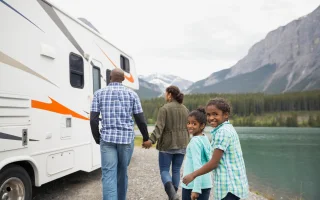Cheap RV or Motorhome Insurance
Affordable Protection Before Your Next Adventure
Affordable Protection for Your Home Away from Home
Whether you are taking advantage of the recent van life trend by purchasing an RV or motorhome, or you just have one for breaks from your regular daily life, RVers know the secrets behind having a mobile home away from home. If you live in your RV or motorhome, you can pack up and travel the country whenever the spirit moves you. If you use it for vacations, you’ll save money on hotels and food. And there’s a great sense of comradery between the friendly souls who frequent RV parks.
Most states require liability insurance for self-powered RVs and motorhomes. Affordable RV and motorhome insurance just makes sense to help you protect yourself and those around you. Acceptance Insurance agents understand the freedom of an RV. Visit with a friendly neighborhood agent to find affordable RV coverage before you hit the road.
How Much Does RV Coverage Cost?
RV coverage costs vary widely due to numerous factors, but the average cost in the U.S. falls somewhere between $600 to $3,000 per year. Why such a wide gap? Here are some factors that go into your RV or motorhome policy cost.

Ready to Get a Quick Quote?
Is There a Difference Between a Recreational Vehicle and a Motorhome?
Although many people use the terms interchangeably, there is a difference between motorhomes and RVs. Motorhomes are always self-propelled units, while recreational vehicles may be as basic as a towable popup camper. When thinking about insuring your own motorhome or RV, you only need to comply with state regulations if it is self-propelled. RV’s include motorhomes and they are typically classified as Class A (think bathrooms, kitchen, luxury), Class B (looks like a van) and Class C (sleeping quarters hanging over the cab).
What is RV or Motorhome Insurance?
As with your car insurance, liability coverage helps pay for injuries and damages you may cause when at fault for an accident or other covered event. All vehicles that move under their own power on state roads must carry some form of liability.
Insurance Coverage Types for Motorhomes
For vehicles traveling under their own power, you’ll need the state-required minimum liability, at the least. Depending on what state you live in, this may include other types of insurance, such as uninsured motorist coverage or some form of medical payments coverage.
Liability Insurance for RV
Liability consists of bodily injury liability and property damage liability. Bodily injury also includes death benefits and helps pay for medical and funeral costs for those injured or killed in a wreck you cause. Property damage helps pay for damages you cause to others property if you are at fault for an accident. Keep in mind that these benefits do not pay for your own injuries or damage in a wreck you cause.

Full Coverage Options for Motorhomes
You can add other types of coverage, such as collision coverage, comprehensive insurance and more. If your vehicle is financed, your lender likely requires you to carry these additional protections. In an accident or other event where your RV is damaged or totaled, these will kick in to cover your repairs or your loss, regardless of fault. Additionally, you may want to consider other coverage types including uninsured motorist coverage and roadside assistance.
By the very nature of using your RV, you’ll be on the road more than normal. Choosing these extra protections will be invaluable if you find yourself stranded. Check with a friendly Acceptance agent for help deciding what works best and fits your budget.
What Factors Will Affect My RV Insurance Premiums?
Like car insurance, RV insurance rates are determined based on various factors. The three main factors are age, gender, and driving history. Furthermore, experience with driving an RV also plays a role in determining the cost. If you have no prior experience with driving an RV, you may end up paying more than an experienced RVer. Additionally, a poor driving record can lead to higher insurance rates.
Type of RV or Motorhome
Recreational vehicles span the spectrum from a basic popup to a luxury Class A motorhome, so your premiums will be different depending on what type you decide to buy. From simple camper vans to ones that include bathrooms and kitchens, the heavier, bigger and more expensive the vehicle, the more expensive to insure.
Amount and Type of Insurance
The amount of protection you choose will have an impact on your rates, as will the types you pick. Basic liability coverage levels may be higher for an RV, since they can cause much more damage in a wreck. But even then, you’ll want to make sure your insurance pays a max amount if you hydroplane in your RV and hit another vehicle, potentially causing injuries and damages. Likewise, you might choose to add additional coverage, such as collision in order to help you repair your RV after a wreck, regardless of fault.Don’t forget deductibles: The higher the deductible, the lower the premium.

What Does RV Insurance Cover?
At its most basic, it helps to pay for damages and injuries to others in an accident you cause. You can also purchase full coverage for greater first-party protection, so you can get your RV repaired or replaced, regardless of fault. You can also purchase additional coverage for items such as awnings and satellite dishes. You may also ask your insurer about items such as:
- Towing and Roadside Assistance
- Fulltime Residence Coverage
- Emergency Expenses
The specific type and amount of coverage needed may vary based on state regulations. To ensure compliance and peace of mind, it’s best to research local laws or speak with your insurance provider.
Can I Get Discounts on RV Coverage?
Yes, you certainly can. Your insurance company should happily offer safe driving discounts, military or first responder discounts, pay premiums up front discount and any number of other discounts, including:
- Bundling: For the best discount of all, bundle all of your policies together with the same company, including home insurance, car insurance and renters insurance.
- Safety and Security Features: Adding additional safety features to your RV, as well as where you park it can result in a discount.
Check with your friendly Acceptance agent to find out how you can qualify for discounts on your policy.
Do I Need RV Insurance?
You will need RV insurance if your vehicle is self-propelled in order to drive legally. Here is a chart with some examples of recreational vehicles that do and do not need insurance.
Get Affordable RV or Motorhome Insurance Today
Everyone needs get-away time and for those with an RV or motorhome, their time away comes without expensive hotels. Saving money while enjoying relaxing times with the family around a campsite is to be treasured. Your RV or motorhome insurance from Acceptance can also save you money and keep your finances protected. You can receive a free online RV insurance quote, call us at 877-405-7102 or stop by and visit with one of our friendly agents at a location near you.
